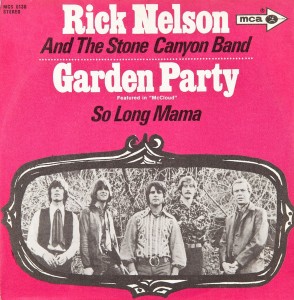 Rick wrote “Garden Party” in response to being booed by audience members at a 1971 oldies show in Madison Square Garden (a “Garden Party”). He was there to perform a few of his many hit songs from the late 1950s, and opened with one of his biggest, “Hello Mary Lou.” He then set out to play newer material, starting with a rendition of the Rolling Stones’ “Country Honk.” Fans, expecting to hear his earlier work, began to boo (many think it actually stemmed from some sort of police presence within the crowd). Rick took it personally and stormed off the stage.
Rick wrote “Garden Party” in response to being booed by audience members at a 1971 oldies show in Madison Square Garden (a “Garden Party”). He was there to perform a few of his many hit songs from the late 1950s, and opened with one of his biggest, “Hello Mary Lou.” He then set out to play newer material, starting with a rendition of the Rolling Stones’ “Country Honk.” Fans, expecting to hear his earlier work, began to boo (many think it actually stemmed from some sort of police presence within the crowd). Rick took it personally and stormed off the stage.
Nelson was so rattled by the crowd’s reaction that he penned “Garden Party,” making not-so-thinly veiled references to all kinds of performers. Here is a sampling of the lyrics:
To reminisce with my old friends: Chuck Berry, Bo Diddley and Bobby Rydell, who were also on the oldies show bill.
Yoko brought a walrus: John Lennon (a nod to his song “I Am the Walrus.”)
I said hello to Mary Lou, she belongs to me: a reference to Rick’s hit, and also to Bob Dylan’s “She Belongs to Me,” a song he once covered.
I sang a song about a honky tonk: The Stones song “Country Honk,” which supposedly incited the booing.
Out stepped Johnny B. Goode…playing guitar like a-ringing a bell: another reference to Chuck.
But who was the Mr. Hughes hiding in Dylan’s shoes? People assumed it was the reclusive Howard, but it was actually a reference to Rick’s next-door neighbor George Harrison, who sometimes used the alias “Mr. Hughes.” The former Beatle had planned to release an album of Dylan covers.
He ended the tale with:
If you gotta play at garden parties
I wish you a lotta luck.
But if memories were all I sang
I’d rather drive a truck (a reference to Elvis, who was once told at an audition: “Stick to driving a truck, because you’ll never make it as a singer.”)
Nelson eventually recovered and continued to perform. In all, he released 19 Top Ten hits between 1957 and 1973, and was posthumously inducted into the Rock and Roll Hall of Fame in 1987.
He died in a plane crash on December 31, 1985, at the age of 45. A variety of chemicals, including cocaine, marijuana, and the painkiller Darvon, were found in Nelson’s blood after the accident. It’s long been rumored that he and fellow passengers set the private plane ablaze while freebasing cocaine, but the National Transportation Safety Board rejects the claim.
What a sad demise for the boy from the so-called idyllic “Ozzie and Harriet” household.
Here’s Rick’s pretty song with the pointed lyrics. Did he overreact to the oldies show incident? Probably, but the song it inspired earned him a nice penny.
© Dana Spiardi, May 7, 2015
]]>Lots of Diddley-based tunes are obvious, like “Willy and the Hand Jive” and Bo’s own “Who Do You Love?” But you may not realize just how many songs have been fueled by that distinctive beat. No rocker can resist it! Here’s a collection of my favorite Bo Babies. Turn your speakers up loud and go crazy, man, crazy!
Here’s the original, from the master himself, born Ellas Otha Bates on December 30, 1928. He entered rock heaven on June 2, 2008. Hundreds paid tribute to him upon his passing: from the U.S. President and House of Representative members, to countless rock and R&B giants. The University of Florida posthumously awarded Bo a Doctor of Fine Arts degree, and a Voice of America radio service declared that “his influence was so widespread that it is hard to imagine what rock and roll would have sounded like without him.”
Buddy Holly wrote and recorded “Not Fade Away,” but there’s absolutely no doubt that The Stones produced the definitive version. Here’s young Mick, shakin’ his money-maker on The Mike Douglas show in 1964. And the late, great Brian Jones plays a mean blues harp.
Here’s my favorite Who song, “Magic Bus.” Betcha didn’t realize this was born of Bo!
Check out this great clip of Bruce honoring Bo with his Diddley-inspired “She’s the One.
Even punk rockers loved Bo. Here’s The Clash, performing one of my favorites, “Rudie Can’t Fail.” For the record, the word “rudie” comes from Jamaican street culture, and quite literally refers to rude (bad) boys. Brit punks of the 1970s quickly co-opted the name!
The Irish know a good beat when they hear one. “Mystic Eyes,” by Northern Ireland’s Them, is a raucous Diddley-based R&B number. Van Morrison wrote it, and belts it out here in this 1965 performance. Have you ever seen Van this young?
From Belfast to Dublin, here’s U2 with “Desire.” You can count on Bono for descriptive lyrics: She’s the dollars; she’s my protection. Yeah she’s a promise in the year of election. Oh sister, I can’t let you go. Like a preacher stealing hearts at a traveling show.
David Bowie’s “Panic in Detroit” is one of my favorite Diddley-inspired numbers:
Here’s a metal version of Bo’s beat from Guns N’Roses: “Mr. Brownstone.” Slash, you do Bo proud!
Oh, Chrissie…how do I love thee? Let me count the ways. Here’s the queen of the Pretenders with “Break up the Concrete.”
We’ll end with Bo in 1989, making some heavy thunder with his trademark rectangular guitar.
Now, doesn’t this trip down Bo Boulevard just make your ENTIRE day? If these rhythms don’t inspire you to move your feet, shake your hips, bop your head, or – at the very least – tap your fingers, then honey, methinks you’re dead.
© Dana Spiardi, March 2, 2013
]]>
What fun listening to commercials and weather reports from a far-away place! WOWO played everything I needed to hear, bridging the gap between my love of pop and my red-hot passion for rock. Oh, those simple days before I discovered eardrum-destroying headphones, Led Zeppelin, and herbed-up, late-night hippie DJs who had the freedom to play whatever they liked.
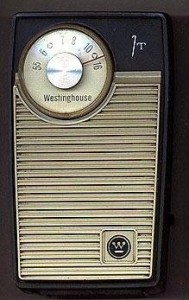 The nocturnal search for good music in a sour milk sea of standards is a tradition that started long before I picked up my first transistor radio (the Westinghouse H-901P7GP). Way back in drab, post-war England, teenaged boys with bad teeth and sun-starved skin – bored to tears with BBC Radio’s unflinching policy of airing nothing but show tunes and classical music – were stringing wires around their small, government-built “council houses” so they could tune in to the one radio station that gave them a reason to live. What they found – from across the English channel – was the infamous “pirate station,” Radio Luxembourg. What they heard was a black-sounding white man named Elvis Presley. And what changed their lives was a moody little tune called “Heartbreak Hotel.”
The nocturnal search for good music in a sour milk sea of standards is a tradition that started long before I picked up my first transistor radio (the Westinghouse H-901P7GP). Way back in drab, post-war England, teenaged boys with bad teeth and sun-starved skin – bored to tears with BBC Radio’s unflinching policy of airing nothing but show tunes and classical music – were stringing wires around their small, government-built “council houses” so they could tune in to the one radio station that gave them a reason to live. What they found – from across the English channel – was the infamous “pirate station,” Radio Luxembourg. What they heard was a black-sounding white man named Elvis Presley. And what changed their lives was a moody little tune called “Heartbreak Hotel.”
The young Elvis had recorded several songs at Sam Phillips’s Sun Studios in Memphis, among them “That’s All Right” and “Blue Moon of Kentucky,” before discovering the song that would catapult him to eternal famedom. Songwriters Mae Boren Axton and Tommy Durden penned “Heartbreak Hotel” after reading a newspaper report about a lovelorn man who jumped from a hotel window, leaving a suicide note with a single line: “I walk a lonely street.” Axton presented the song to Elvis at a country music convention in 1955. The soon-to-be-king was intrigued by the song’s soul-searing, bluesy feel and agreed to record it at RCA studios – much to the dismay of friends and producers who found it gloomy, unappealing, and unworthy of Presley’s high energy talent.
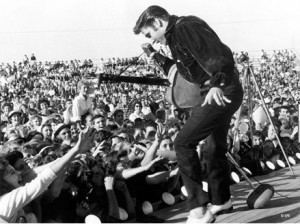
According to Elvis biographer Peter Guralnick, Sam Philips described the finished product as a “morbid mess,” despite the fact that two legendary artists – guitarist Chet Atkins and pianist Floyd Cramer – contributed to the track. But Elvis had good instincts. The song became a number one hit record, his first million-selling song, and the biggest-selling single of 1956.
I believe that this song – delivered by a poor white boy in the sex-drenched tradition of black R&B – changed the course of music. More than any other song up to that point, it inspired young men to pick up guitars and dare to stretch their coming-of-age vocal chords — all to carry the message of this new thing called rock-n-roll. And nowhere was this more evident than in England, where rock’s future superstars were driven to distraction by their desire to emulate Elvis. The Beatles changed the world in the 1960s, but only because Elvis changed their world in the 1950s.
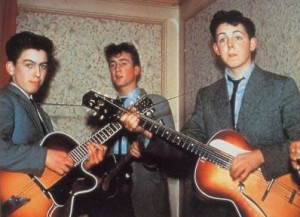 “Before Elvis, there was nothing,” John Lennon once said. “When I first heard ‘Heartbreak Hotel’ I could hardly make out what was being said. It was just the experience of hearing it and having my hair stand on end. We’d never heard American voices singing like that…Suddenly there’s this hillbilly hiccupping with echo and all this bluesy background going on. We didn’t know what the hell Elvis Presley was singing about or Little Richard or Chuck Berry…To us, it just sounded like great noise.”
“Before Elvis, there was nothing,” John Lennon once said. “When I first heard ‘Heartbreak Hotel’ I could hardly make out what was being said. It was just the experience of hearing it and having my hair stand on end. We’d never heard American voices singing like that…Suddenly there’s this hillbilly hiccupping with echo and all this bluesy background going on. We didn’t know what the hell Elvis Presley was singing about or Little Richard or Chuck Berry…To us, it just sounded like great noise.”
Rolling Stones guitarist Keith Richards echoed this sentiment in his memoir, Life: “Good records just get better with age. But the one that really turned me on, like an explosion one night, listening to Radio Luxembourg on my little radio when I was supposed to be in bed and asleep, was ‘Heartbreak Hotel.’ That was the stunner. I’d never heard it before, or anything like it. I’d never heard of Elvis before. It was almost as if I’d been waiting for it to happen. When I woke up the next day I was a different guy.”
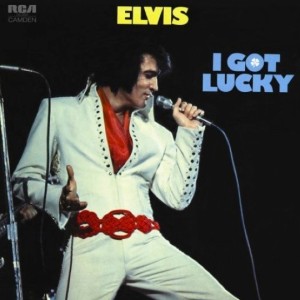 Says Sir Elton John: “I remember so well the day my mother came home with a 78 of ‘Heartbreak Hotel.’ She said she’d just heard it in the record shop and she knew she had to buy it straight away. So she put it on for us both to listen to and I’d never heard anything like that before in my whole life. It completely changed the way I listened to music forever. It was just so primal…I’d never been around music like that, music that was so powerful.”
Says Sir Elton John: “I remember so well the day my mother came home with a 78 of ‘Heartbreak Hotel.’ She said she’d just heard it in the record shop and she knew she had to buy it straight away. So she put it on for us both to listen to and I’d never heard anything like that before in my whole life. It completely changed the way I listened to music forever. It was just so primal…I’d never been around music like that, music that was so powerful.”
So, whatever image you may have of Elvis – be it the gorgeous, hip-swiveling sensation of the 50s, the perfectly-coifed singing movie star of the 60s, or the paunchy, pill-addicted Vegas act of the 70s – don’t ever forget that he was the man who set the music world on fire. He didn’t invent R&B wailing and fancy legwork – he copied much of that from the Southern black artists he loved – but he had the smarts to repackage it and the moxie to present it to a lilly-white audience trapped in an era of conformity and conservatism. Happy 80th birthday, Elvis. Long live The King!
Here’s he is, belting out the song that set the world of fire.
Dana Spiardi, Jan 8, 2015
]]>